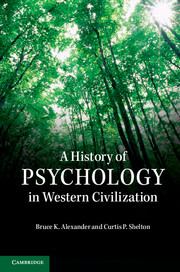Book contents
- Frontmatter
- Dedication
- Contents
- List of figures
- List of tables
- Preface
- Acknowledgements
- 1 Introduction: Two histories of Western psychology
- 2 Rationalism: Plato and the “just” person
- 3 Stoicism: Marcus Aurelius and the sufficient self
- 4 Christianity: St. Augustine and the incomplete soul
- 5 Materialism: Thomas Hobbes and the human machine
- 6 Empiricism: John Locke, David Hume, and experience as reality
- 7 Evolution: Charles Darwin and Homo sapiens as a work in progress
- 8 Medicine: Sigmund Freud and the world of neurotics
- 9 Re-imagining psychology
- Appendix A Plato’s nature of intelligence and other faculties
- Appendix B The search for Aunt Lena
- Index
- References
7 - Evolution: Charles Darwin and Homo sapiens as a work in progress
Published online by Cambridge University Press: 05 July 2014
- Frontmatter
- Dedication
- Contents
- List of figures
- List of tables
- Preface
- Acknowledgements
- 1 Introduction: Two histories of Western psychology
- 2 Rationalism: Plato and the “just” person
- 3 Stoicism: Marcus Aurelius and the sufficient self
- 4 Christianity: St. Augustine and the incomplete soul
- 5 Materialism: Thomas Hobbes and the human machine
- 6 Empiricism: John Locke, David Hume, and experience as reality
- 7 Evolution: Charles Darwin and Homo sapiens as a work in progress
- 8 Medicine: Sigmund Freud and the world of neurotics
- 9 Re-imagining psychology
- Appendix A Plato’s nature of intelligence and other faculties
- Appendix B The search for Aunt Lena
- Index
- References
Summary
“Another curious aspect of the theory of evolution is that everybody thinks he understands it.”
Jacques Monod (1975, p. 12)The best-known statement of the evolutionary perspective on psychology was written by Charles Darwin (1809–1882). Other evolutionary thinkers are easy to overlook today because Darwin’s well-deserved fame so greatly outshines those who preceded him – as well as those who followed him. Yet, the core of evolution – the idea that change is the basic fact of nature – is as old as scholarly history itself. Leahey (2001, p. 155) described the rise of Darwin’s influence in modern times with the phrase “Heraclitus triumphant,” referring to Heraclitus of Ephesus, a Greek philosopher who lived about a hundred years before Plato. In his theory of flux, Heraclitus proposed that everything on earth is constantly changing. We know of Heraclitus today only from short quotations in other ancient scholars’ works, but he wrote at least one book that was taken very seriously in the ancient world, particularly by Plato and by the Stoics.
Aristotle (384 BC–322 BC), who was a great naturalist and classifier of plant and animal species, also had a deep connection with evolution. Although Aristotle could not actually be labeled an evolutionist, historians of biology have recognized that he provided essential ideas that made the later development of evolutionary theory possible. First, he emphasized the principle of continuity. After examining many specimens of animals, he saw that they did not fall into completely distinct types, but varied along a continuum so that the border separating one type from another was somewhat arbitrary. This principle later proved essential to understanding the origin of species in evolutionary terms (Lovejoy, 1936, pp. 56–58). Second, Aristotle recognized that each maturing individual creature developed in a way that was largely predictable.
- Type
- Chapter
- Information
- A History of Psychology in Western Civilization , pp. 333 - 395Publisher: Cambridge University PressPrint publication year: 2014



